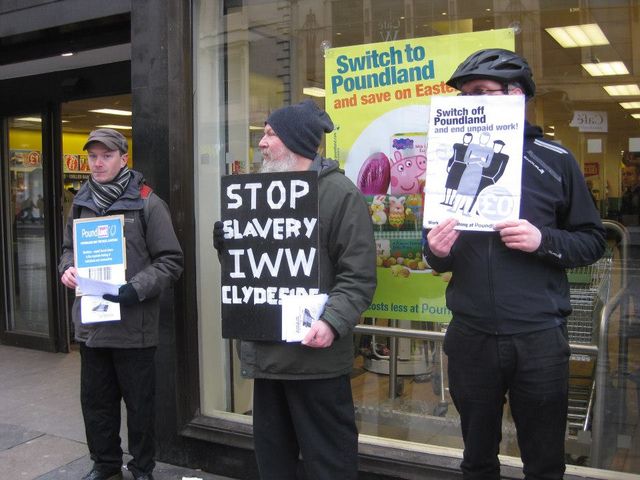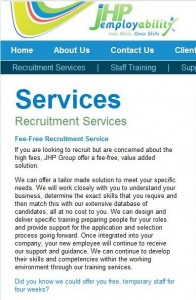At the start of the week of action, the Employment Related Services Association (ERSA) put out a “myth buster” in defence of workfare. The ERSA is the trade body for welfare to work companies like A4e and JHP Employability, so it’s no surprise that their myth buster continues to propogate myths about workfare.
Yesterday demonstrations and pickets took place around the UK. Today we are back online, and asking you to combat the lies ERSA is telling about workfare, and spread the simple truth that workfare doesn’t work. So firstly we explore the five “myths” about workfare, and then five truths that you can help share.
The workfare industry’s myth: Workfare is only used in a limited way
The ERSA claim that workfare is only used in a limited way, but 163,000 people were on “Government training and employment support programs” in February 2013 – over 10% of JSA claimants, counted as in work by government statistics. Given how little actual training is available, chances are most of these were on a workfare scheme. Our experience says it’s pretty rare for someone to get beyond six months of unemployment before they are pushed onto a work placement.
Even if we just take Mandatory Work Activity, 92,000 people were sent on this scheme between November 2011 and October 2012. 20% of those referred to MWA were sanctioned.
The ERSA claim that MWA is not used punitively, but if it were the garden of opportunity that it is portrayed to be, why would it be necessary to have sanctions in place? This can only be to punish those who decide that it is not going to be helpful to them to do the work placement. In the past couple of days we have once again been shown that Iain Duncan Smith and the DWP have been lying about targets – if this is not about punishment, how can you have targets for how many people you sanction?
ERSA deliberately confuse the DWP’s terminology by conflating Work Placements (which are always mandatory) and Work Experience (which may sometimes be voluntary) into Work Experience Placement – further obscuring the compulsion behind schemes which are backed by sanctions or the threat of schemes with sanctions.
As for their claim that some ‘work experience’ schemes are not workfare, we’ve busted that myth here.
Workfare industry myth: individuals are not placed where they are at risk of exploitation from an employer
ERSA tries to argue that because these schemes are not slavery, they don’t exploit people! Boycott Workfare does not call these schemes slavery, however many people forced onto workfare do, such as 19 year old Gary Parker, forced to work in Derbyshire who said said he considered his placement as a
kind of slavery. I have no choice, If I don’t go I don’t get any money.Under this “myth” the ERSA also tell us that the workfare rules say
placements must be in addition to existing or expected vacancies.This means they admit that Mandatory Work Activity cannot create any jobs, and this means that it cannot help unemployment. The only way to reduce unemployment is to increase the amount of jobs available, but even the guidance for placements says that they cannot do this.
Workfare industry myth: Work Programme providers do not force people to do unwanted work experience

Glasgow
ERSA argues that Work Programme providers wouldn’t force people to do something that won’t help them get work because they won’t get paid if they don’t help find someone a job.
But the fact that the Work Programme is actively stopping people from getting a job is surely the only evidence we need that Work Programme providers aren’t very good at working out what helps people find work.
The ERSA say
Mandation is used only in a minority of circumstances and must deliver a benefit to the local communityBut we know that people are pressured into taking placements or not properly informed about whether they are mandatory or not. And the “benefit to the local community”? Well investigations have shown that can include cleaning private homes for profit making organisations as schemes get abused.
And when workfare can force someone to leave a genuinely voluntary placement for a workfare placement, can this really be said to have “benefit to the local community”?
Workfare industry myth: Workfare does not replace jobs or undermine wages

Work experience placements organised via the Work Programme and Mandatory Work Activity programme are unpaid precisely so they do not displace paid workers.This is amongst the strangest statements that have ever been made about workfare. The ERSA reckon that having a regular supply of unpaid workers does not replaces paid jobs or undermine wages. We know that it does. We know that ASDA reduces overtime hours for staff. We know that Argos replaced Christmas temps with workfare staff – JHP Employability even advertised workfare as “free temporary staff for up to four weeks” on their website until recently.
So the ERSA think that companies will not replace paid workers because the workers they are going to get are unpaid. Seriously think about that statement for a moment. It means that the ERSA think that if workfare was paid by the companies, then the paid work of workfare would displace the paid work of working, and that what prevents this displacement is the fact that workfare is unpaid. Because no company ever wants unpaid workers.
Both logic and anecdotal evidence show that workfare does replace paid jobs, but we don’t and can’t know how strong this effect is. If the government did some trials with some shops taking placements and others not, then perhaps they could see how recruitment and working patterns changed and see just how much of an effect workfare has on paid work. But they don’t do this, and they won’t because they know it could only show one thing – workfare increases unemployment by replacing paid jobs.
Workfare industry myth: There is no public outcry over the use of workfare
Oddly enough, the ERSA have gone back to a poll done in March 2011 for workfare thinktank Policy Exchange – long before workfare hit the headlines and people became more aware of what it is and how it affects jobseekers – to find support for their position that the public don’t object to workfare.
Over the past two years, Boycott Workfare and other organisations have campaigned successfully to change this situation and now there is strong and wide opposition to workfare schemes that do not help people get a job.
We have seen opposition growing and growing. If this were not the case, would the DWP be saying that protests may cause the collapse of workfare?
In fact opposition is growing as it becomes clearer and clearer that workfare doesn’t work, that workfare is used as punishment, that workfare threatens paid jobs and that sanctions on the scheme are applied as often as possible pushing people into debt, hunger and homelessness.
Five Truths About Workfare:

Today is the last day in the week of action. Today we want you to spread these messages, copy and paste into facebook, twitter and anywhere else you like:
Workfare Doesn’t Help Find Work – no scheme does better than the JCP, the Work Programme stops people finding work http://www.leftfootforward.org/2013/03/five-things-the-government-wont-tell-you-about-workfare/
Workfare can’t reduce unemployment – With no job creation mechanism, all it can do is change who gets a job, which doesn’t cut unemployment. By threatening paid work, the only thing workfare can do is increase unemployment, except of course in the statistics http://www.boycottworkfare.org/?p=1659
Workfare Threatens Paid Work – With a steady supply of free labour, companies will obviously cut paid jobs and hours http://www.channel4.com/news/now-asda-is-accused-of-employing-youths-for-no-wage
Work Experience Scheme is workfare – Some sanctions remain and if you refuse, you are threatened with the Mandatory Work Activity scheme instead http://www.boycottworkfare.org/?p=2230
There are sanctions targets – The government was shown to be lying about this in 2011, and it’s been shown to be lying again this week. http://www.guardian.co.uk/society/2013/mar/21/jobcentre-set-targets-benefit-sanctions
The fact that the workfare industry’s trade body has felt the need to push out more myths about workfare is a clear sign that what you are doing is making an impact! Keep up the good work and help challenge their lies wherever you find them!
If you’d like to respond to ERSA’s myths directly. You’ll find them on Twitter as @ersa_news and their contact form here.



